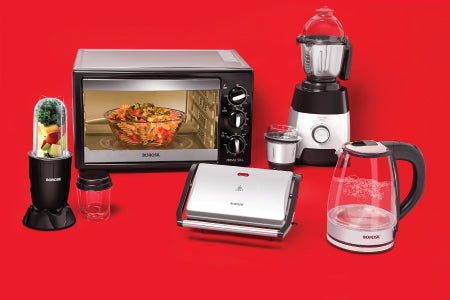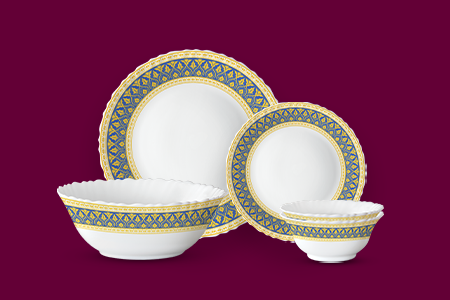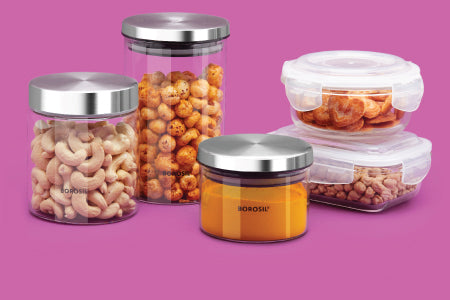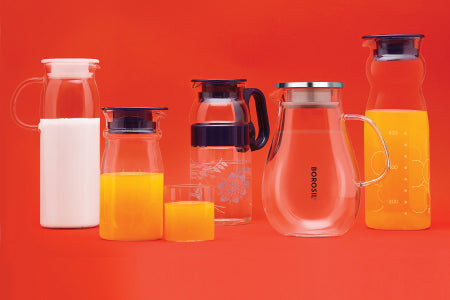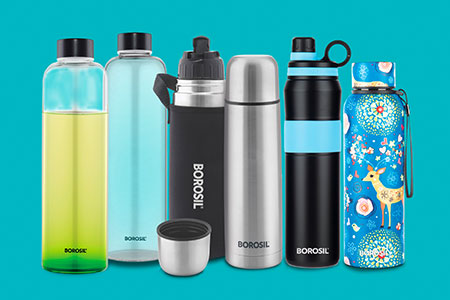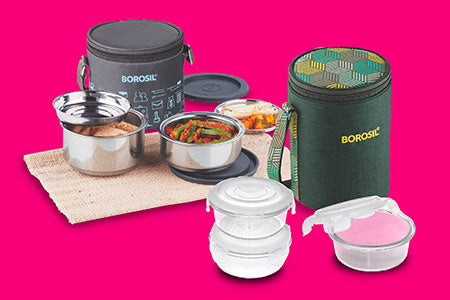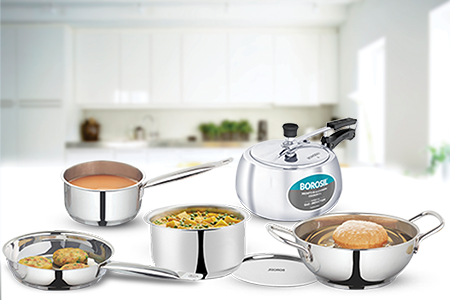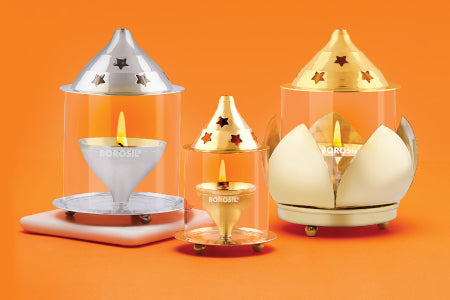
5 Reasons To Use A Refillable Bottle
At least one million plastic disposable bottles are purchased every second around the world. Think about the amount of raw material required to produce these bottles, and now just think about the space they will occupy after they're discarded. Once designed for convenience and sanitation, plastic bottles for one-time use have become one of our biggest environmental hazards. This, however, is also one of the easiest problems to fix with the perfect alternatives.
Reusable Water Bottles are a switch we know you want to make and are available in Reusable Borosilicate Glass Water Bottles and Reusable Stainless Steel Water Bottles. Not only are refillable water bottles a great way to minimise the plastic pollution crisis, but they are also sure to be very useful if you carry beverages on the go. So, let’s explore the benefits of reusable water bottles!
What Are Reusable Water Bottles Made From?
Reusable water bottles are comprehensively helpful. These sustainable bottles utilise fewer resources in comparison to ordinary water bottles. Not ending here, producing these bottles lowers the release of harmful gases into the air. Thus, safeguarding the water bodies and other land-based organisms, even humans, from harmful toxins.
You can buy reusable water bottles made from stainless steel, copper, BPA-free plastics, aluminium and glass in the market. There are multiple environmental benefits of reusable water bottles. Plus, each is available in ergonomic designs, lasts long and offers adequate health benefits to the user.
What Are Plastic Bottles Made Of?
Polyethylene terephthalate is the resin used to produce most plastic water bottles and has been in existence since 1941. The basic combination of materials for manufacturing a plastic water bottle includes synthetic organic polymers from fossil fuels and percentages of natural gas, coal, and crude oil.
Even before plastic bottles are made, the drilling and extraction of oils create tremendous environmental pollution. 17 million barrels of oil are required annually to produce a year’s supply of disposable bottles. From oil extraction to plastic bottle production and finally filling them up with water, it generates 2.5 million tons of carbon dioxide annually.
5 Benefits Of Using Reusable Water Bottles
In every way that plastic bottles are harmful, reusable bottles are all things good for health and the environment. They take less oil to produce, replace the plastics and reduce the carbon footprint, minimising the over-loaded landfills, oceans and other places where we dump our plastic wastes.
To convince you perfectly why reusable water bottles are good, read along our top 5 reasons to ditch the guilt of using plastic water bottles and switch to refillable water bottles today!
1. Limit The Pollution Of Waterways
Without a doubt, plastic bottles are one of the most littered items in our water bodies. Littered on the beaches and river banks, it is unfortunate that when we see clean beaches, that is more of a surprise than seeing one where you throw your waste on the go. Did you know that even landfill liners leak harmful pollutants into the watershed from plastic waste? Now, think about how much work will be reduced to control water pollution using reusable water bottles.
2. Combat Global Warming
The mere production of plastic water bottles emits about 2.5 million tonnes of carbon dioxide into the air. Playing a key role in greenhouse gases, CO2 is one of the biggest sources of air pollution. Therefore, using refillable water bottles will reduce pollution on multiple levels and help combat global warming.
3. The Sustainable Choice
Disposable bottles have got their name as they are meant to be disposed of after a single use. Suppose sustainability and zero-waste is the mantra you follow. In that case, the durable choice is a refillable bottle with elegant and appealing designs available in a huge variety.
4. Waste Management
Plastic takes over 400 treacherous years to degrade. What's worse is all the talks of ‘recycling of plastics’ are not executed too often, and 91% of plastic products don't get recycled. This leaves them in landfills and oceans. Manufacturing and transportation alone take a toll on natural resources and fossil fuels, which can only be prevented through the collective use of reusable water bottles.
5. Versatility And Temperature Controls
Can you ever carry your citric juices or a hot cup of tea or coffee in a plastic bottle? Of course not, as the temperature and contents of the beverage will react with the plastic and outside temperatures and leach chemicals into your drink. Refillable plastic bottles add versatility and convenience by allowing you to carry all sorts of beverages and retain their temperatures for long hours while looking as sleek as ever.
What Makes A Water Bottle Refillable?
But have you thought about what makes a water bottle refillable? As a steady answer to the question, you have the following points defined below.
- A refillable water bottle should be durable enough to last through repeated use without breaking.
- It should prevent harmful chemicals from leaching into your drink to ensure it's safe and healthy.
- The bottle must be designed for carrying beverages on the go, making it practical and convenient.
- It must withstand exposure to heat and moisture without compromising its integrity or safety.
What Type Of Reusable Water Bottles Should You Buy?
Copper, Stainless Steel and Borosilicate glass reusable water bottles are ergonomic and refined for daily use. Water stored in these is free of toxins and stays fresh for long. However, with so many varieties, things can get confusing at times. So here is an adequate help:
Copper Bottles
Drinking water daily from copper bottles has proven to be beneficial for many. Water stored in a copper bottle is free from plastic waste and microorganisms like bacteria, algae and fungi. Also, leaving water in a copper bottle overnight acquires certain metal goodness, improving skin and cardiovascular health. But while purchasing, ensure you use a wide-mouth bottle and check for any leakages.
Stainless Steel
Stainless steel bottles are toxin-free and will never react with the drink stored. The bottles come with food-grade BPA and phthalate-free plastic parts when you buy them right. Get a bottle that will keep your drink cold for 24 hours and hot for 20 hours, which you can carry to college or workplace. Moreover, those bottles are the best, offering a condensation-free exterior and cool-to-touch body.
Borosilicate Glass
When looking for something aesthetic, opt for a glass bottle made of Borosilicate. These are durable, toxin-free and freezer compatible. You can use the bottle to store water and juice as convenient. You might be thinking, why borosilicate glass and not a regular lime glass bottle? That is because the former is more durable and non-porous than the latter. Also, borosilicate varieties are scratch-resistant. Bottles made from borosilicate glass will retain the perfect clarity even after multiple uses.
Why Should You Stop Using Disposable Plastic Water Bottles Today?
Now that you know the 5 environmental benefits of reusable water bottles. Look at why are reusable water bottles good for the environment and why you should stop using disposable plastic water bottles today!
Ocean Pollution
Discarded plastic water bottles and caps comprise the most recovered plastic trash from the ocean. 8 million plastic waste enters the ocean annually, killing 1.1 million+ marine animals and sea birds.
The plastic bottles floating around in the ocean degenerate, breaking into microplastics and potentially threatening marine life. If necessary precautions are not taken soon, by 2050, more plastics will be in oceans than fish.
Landfill Occupation
Disposable plastic bottles are great on durability, making them earn a greater percentage of being hazardous to nature. A plastic water bottle can last for 450 years before completely disintegrating. Because it is highly resistant to degeneration, a majority of the valuable space on Earth gets filled up by the same.
The population is rising steadily, and so is the plastic waste. Without proper mitigation, things will eventually go out of hand. There will be a time when most of the available land will be filled with plastics, leaving no space for humankind to live.
Human Health Hazards
As per research, 90% of bottled water contains disturbing levels of microplastics. It is the toxic nature of the microplastics which makes them carcinogenic. These microplastics can affect safe drinking water availability when continued for the longest.
Drinking clean water is essential for the well-being of the human race. However, disposable bottles expose one to greater levels of microplastic percentage in water, putting health in danger. So far, microplastics have already been found in tap water in many places worldwide.
Greenhouse Gas Emissions
As already discussed, extracting oils to produce plastic is quite hazardous, polluting the environment. This, in the long run, leads to global warming. Also, PET bottle companies are vulnerable to fire hazards and other toxin leaks. Such unwanted accidents have already been registered in countries like Belgium and Norway, where the workers were taken to the hospital.
Also, after use, when these plastic bottles are burnt in place, such a process releases toxic fumes polluting the environment. Polyvinyl chloride, carbon dioxide, dioxins, and polychlorinated biphenyls are some gases released into the environment.
Conclusion
While we can list endless benefits of reusable water bottles, apart from the environment, the most advantageous ones are saving money, staying hydrated, making healthier choices and might even end up drinking more water than usual. And now that we know we have convinced you well, go ahead and take your pick at the best reusable water bottles today.
Frequently Asked Questions
1. Are reusable water bottles hygienic?Yes! You can use disposable water bottles of copper, stainless steel or borosilicate glass. Make sure to clean those at regular intervals to ensure the ultimate hygiene.
2. How long can someone store water in a reusable stainless steel bottle?Stainless steel bottles are toxic-free and will never react with the water. If your bottle is clean, you can store water in it for months.
3. How can kids reap the health benefits of using reusable water bottles? Drinking water in reusable water bottles made of copper, stainless steel or glass from a tender age exposes the kids to the goodness of clean water free from microplastics. This will help them with better eyesight, mental growth, and physical health.

